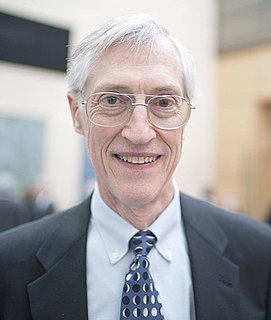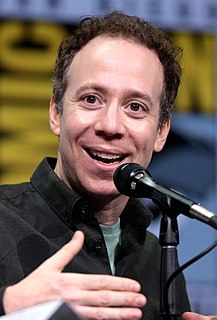A Quote by Neil deGrasse Tyson
Don't know if it's good or bad that a Google search on “Big Bang Theory” lists the sitcom before the origin of the Universe
Related Quotes
Modern thinking is that time did not start with the big bang, and that there was a multiverse even before the big bang. In the inflation theory, and in string theory, there were universes before our big bang, and that big bangs are happening all the time. Universes are formed when bubbles collide or fission into smaller bubles.
Dilbert: It took weeks but I've calculated a new theory about the origin of the universe. According to my calculations it didn't start with a "Big Bang" at all-it was more of "Phhbwt" sound. You may be wondering about the practical applications of the "Little Phhbwt" theory. Dogbert: I was wondering when you'll go away.
Observations indicate that the universe is expanding at an ever-increasing rate. It will expand forever, getting emptier and darker. Although the universe doesn’t have an end, it had a beginning in the Big Bang. One might ask what is before that but the answer is that there is nowhere before the Big Bang just as there is nowhere south of the South Pole.
One can imagine that God created the universe at literally any time in the past. On the other hand, if the universe is expanding, there may be physical reasons why there had to be a beginning. One could imagine that God created the universe at the instant of the big bang, or even afterwards in just such a way as to make it look as though there had been a big bang, but it would be meaningless to suppose that it was created before the big bang. An expanding universe does not preclude a creator, but it does place limits on when he might have carried out his job!
In the popular mind, if Hoyle is remembered it is as the prime mover of the discredited Steady State theory of the universe. "Everybody knows" that the rival Big Bang theory won the battle of the cosmologies, but few (not even astronomers) appreciate that the mathematical formalism of the now-favoured version of Big Bang, called inflation, is identical to Hoyle's version of the Steady State model.
Big bang cosmology is probably as widely believed as has been any theory of the universe in the history of Western civilization. It rests, however, on many untested, and in some cases untestable, assumptions. Indeed, big bang cosmology has become a bandwagon of thought that reflects faith as much as objective truth.
The universe starts off with the Big Bang theory, and the first thing that emerged from the Big Bang is essentially hydrogen and then helium. And that's what combusts in stars. Finally, stars implode, and they build heavier elements out of that. And those heavier elements are reconstituted in the heart of other stars, eventually.
Our entire universe emerged from a point smaller than a single atom. Space itself exploded in a cosmic fire, launching the expansion of the universe and giving birth to all the energy and all the matter we know today. I know that sounds crazy, but there’s strong observational evidence to support the Big Bang theory. And it includes the amount of helium in the cosmos and the glow of radio waves left over from the explosion.































